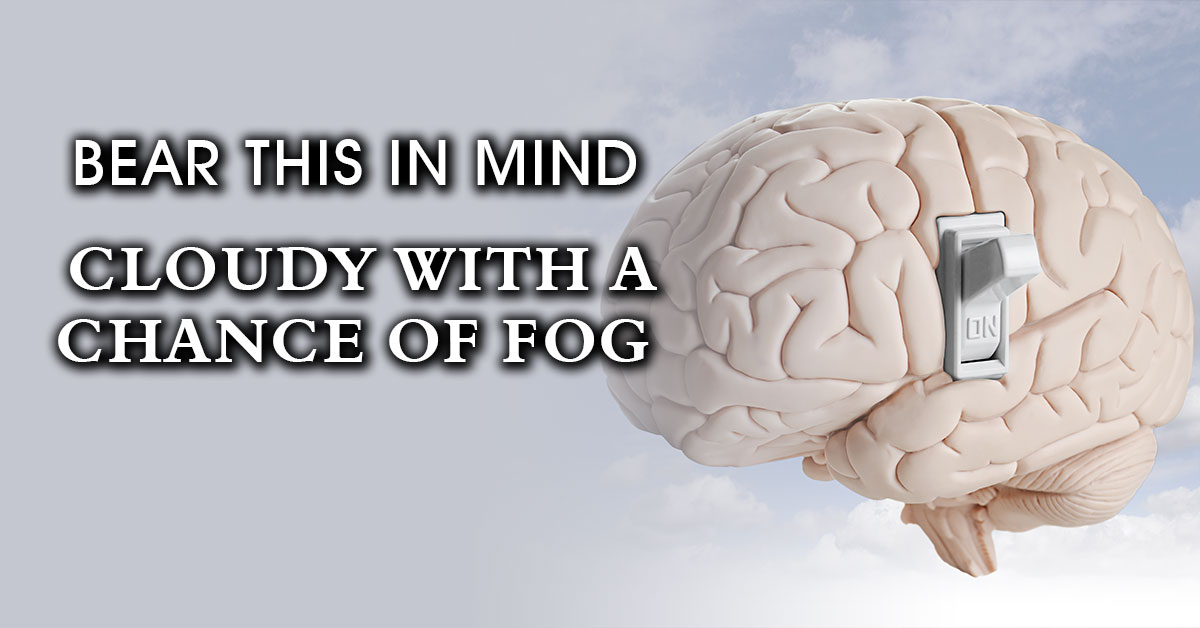BEAR THIS IN MIND – CLOUDY WITH A CHANCE OF FOG

Of course, there’s the fuzz that comes as the result of a night of nonstop drinking. You wake up thinking, “what happened, what did I say, did I insult anyone, come on to anyone or act like a total jerk?” Happens to everyone, sometimes without alcohol as the stimulus. Brain fog is an inability to really punch through. It’s a vague sense of what your brain is trying to retrieve, but you can’t focus on it. Brain fog can precede, accompany or follow an episode of nervousness, anxiety, fear and stress. The clouds just keep rolling in. The effort to harness those thoughts can be as draining as physical activity. It can mentally exhaust you, but fortunately, it’s temporary. Sounds simplistic, but just try to take it easy, and try to figure out where the anxiety is coming from. And quit the multitasking. Go into a temporary device shutdown. It is important to know that brain fog can be caused by other medical issues, so if it persists, see your doctor.
I’M SURE I REMEMBER WHERE I PUT IT
Opps, there it is again. In the blink of an eye, you miss your exit, send an email to the wrong person, or forget what you went into the next room to grab. These changes in your memory function could be a sign that your brain is on a gradual decline. Let’s take a look at what memory is. When an event happens, when you learn something, or when you meet someone, your brain determines whether that information needs to be saved. If your brain judges the information important, it places it in your memory “files.” Sometimes you label it wrong and file it in the wrong place. Many things can make this happen. Concussions; even from bike or skate board dumps, traumatic brain injury, abusing alcohol or drugs. Someone who has a memory problem will be unable to remember important things for varying lengths of time. The more severe the illness or injury, the longer the memory loss is likely to last. Some people forget just the moments right before and after an injury, which is not unusual with a concussion. Sometimes, these memories come back. At this point you really have to be alert as to what’s going on.
SENIOR MOMENTS AREN’T JUST FOR SENIORS
It’s typical for people to forget more things as they grow older. Actually, it has become part of our jargon to joke about having a “senior moment” no matter how old we are. And how many of us are “absentminded” from too much stimuli time to time? How many of us say “our minds were somewhere else at the minute”? Many people over the age of 60 have this common problem, and it is not dementia. For example, it tends to be harder to learn new skills the older you become, or you may more easily forget the names of people you have recently met. It is thought that the more you use your brain when you are older, the more it may counter the development of this age-related decline in memory function. So, doing things such as reading regularly, quizzes, crosswords, memorizing plays or poetry, learning new skills, etc., may help to keep your memory in good shape. “Use it or lose it” applies to every moving, functioning part of us. It’s not that we totally lose memories at this point, it’s just that we get a little more forgetful as our brains decline with age. Hey, there aren’t a lot of seniors doing triathlons as they get older, either.
IMPOSSIBLE TO FORGET
You’ve been racking your brain, wondering if something serious is going on. It seems that more and more, you can’t seem to remember things. The questions swirl in your head; “Do I have Alzheimer’s? Am I going to lose my mind?” It’ terrifying. We get it. But keep this is mind; just losing your memory isn’t always cause for panic. There is a definite link between hormone imbalances and what goes on in your thought processes. Just as hormones are the chemical messengers in the body telling your organs how to function, the brain is the master controller of the nervous system using chemicals called neurotransmitters to “talk” with itself. Neurotransmitters are the chemical messengers of the nervous system, made by nerve cells. Hormone balances are multi- factorial disorders, meaning they are caused by a combination of factors such as your diet, medical history, genetics, stress levels and exposure to toxins from your environment. Which means there is a lot that can go wrong. All of which can cause problems that mimic mental health issues. Well, keep this in mind; Stephen A. Goldstein, M.D, F.A.C.S. at Denver Hormone Health knows just where to start to get answers. With a few simple tests, he can determine if hormones are the issue, and if that’s the case, create a unique treatment plan which along with diet and exercise can put you back in a healthy frame of mind. Call now to see how he can help.
Without question.
